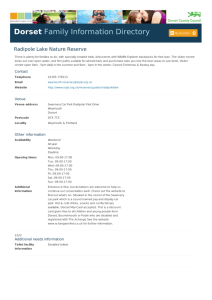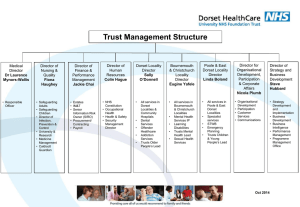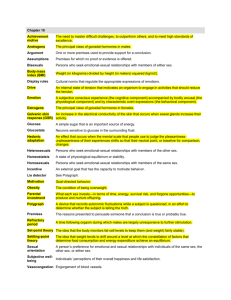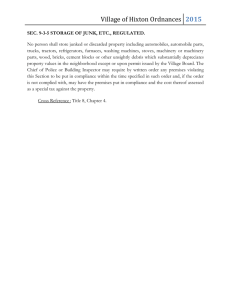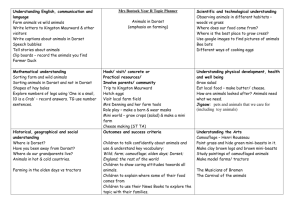guidance for new food businesses (word, 790kb)
advertisement
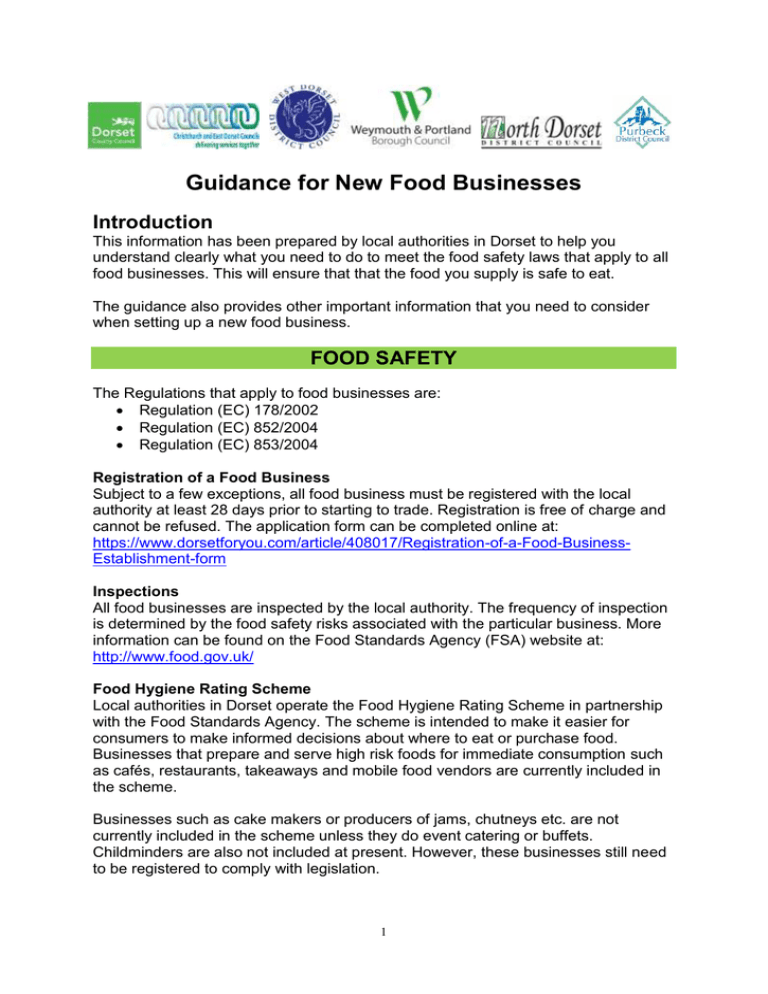
Guidance for New Food Businesses Introduction This information has been prepared by local authorities in Dorset to help you understand clearly what you need to do to meet the food safety laws that apply to all food businesses. This will ensure that that the food you supply is safe to eat. The guidance also provides other important information that you need to consider when setting up a new food business. FOOD SAFETY The Regulations that apply to food businesses are: Regulation (EC) 178/2002 Regulation (EC) 852/2004 Regulation (EC) 853/2004 Registration of a Food Business Subject to a few exceptions, all food business must be registered with the local authority at least 28 days prior to starting to trade. Registration is free of charge and cannot be refused. The application form can be completed online at: https://www.dorsetforyou.com/article/408017/Registration-of-a-Food-BusinessEstablishment-form Inspections All food businesses are inspected by the local authority. The frequency of inspection is determined by the food safety risks associated with the particular business. More information can be found on the Food Standards Agency (FSA) website at: http://www.food.gov.uk/ Food Hygiene Rating Scheme Local authorities in Dorset operate the Food Hygiene Rating Scheme in partnership with the Food Standards Agency. The scheme is intended to make it easier for consumers to make informed decisions about where to eat or purchase food. Businesses that prepare and serve high risk foods for immediate consumption such as cafés, restaurants, takeaways and mobile food vendors are currently included in the scheme. Businesses such as cake makers or producers of jams, chutneys etc. are not currently included in the scheme unless they do event catering or buffets. Childminders are also not included at present. However, these businesses still need to be registered to comply with legislation. 1 New businesses normally receive a scheme rating at the first inspection. Once you have started trading, an officer can visit you at any time that you are open. It is up to you to make sure that your business complies with all the legislation to ensure that you secure a good rating. Following the inspection you will be provided with a window sticker to display in your premises and your rating will be made available to the public on the Food Standards Agency website at: http://ratings.food.gov.uk/ The leaflet ‘Good hygiene is good for your business’ provides more details about the scheme, including how you can appeal your score. It is available from: http://www.food.gov.uk/sites/default/files/multimedia/pdfs/publication/goodhygienego odforbusiness.pdf Information on the scheme is also available on the Dorset for You website at: https://www.dorsetforyou.com/food-ratings Food Safety Management A documented food safety management system is central to complying with food safety legislation. It involves considering in detail how you handle, store and prepare foodstuffs at all stages from purchase of ingredients to serving your customers. You need to identify what food safety hazards exist at each stage and ensure that the appropriate controls and procedures are in place to prevent these hazards from causing illness or injury. Safer food, better business (SFBB) has been produced to assist small businesses in meeting this requirement. You can download and print a copy of the pack from the FSA website at: http://www.food.gov.uk/business-industry/caterers/sfbb/sfbbcaterers/ Please note: SFBB is suitable for most restaurants, cafés, and takeaways but it is not suitable for small manufacturers (including those based in domestic premises), or specialist retailers such as butchers, fishmongers and bakers. If SFBB is not suitable for your business you will need to write a bespoke Hazard Analysis Critical Control Point (HACCP) system to ensure the safety of your products. To do this you will need to have sufficient technical and microbiological knowledge to identify all the risks and control measures. You may need to seek advice from a food technologist and/or microbiologist. You can contact your local Environmental Health department if you wish to discuss this. The FSA has devised MyHACCP, a free online tool intended to support small food manufacturing businesses in the development of their HACCP-based food safety management system. It takes you through a step-by-step process to identify the food safety hazards and controls and documents the outputs in a downloadable form. You can access MyHACCP from: https://myhaccp.food.gov.uk/ 2 Training The proprietor of a food business must ensure that food handlers are supervised and instructed and/or trained in food hygiene matters relevant to their work. You (and other key staff) are advised to undertake training equivalent to the CIEH Level 2 Award in Food Safety in Catering (formerly known as the Basic or Foundation Certificate) before you start to trade. Details of training courses and local training providers can be found on the Dorset for You website at: https://www.dorsetforyou.com/article/406825/Food-hygiene-training Please note: that for high risk food activities or those requiring a bespoke HACCP, a higher level of training is advisable. Prevention of cross-contamination The FSA has issued guidance on the steps that food businesses need to take to control the risk of food becoming contaminated by E. coli O157. The key measures are: Identification of separate work areas, surfaces and equipment for raw and ready-to-eat food, where possible. Use of separate complex equipment such as vacuum-packing machines, slicers and mincers where the cleaning of such equipment between use for raw and ready-to-eat food would be too difficult. Hand washing carried out using a recognised technique. Anti-bacterial gels must not be used instead of thorough hand washing. Effective cleaning procedures. Use of disinfectants and sanitisers that meet officially recognised standards BS EN 1276:1997 or BS EN 13697:2001. If the labels do not provide this information you may be able to check whether the products meet the standards from the following website: http://www.disinfectant-info.co.uk/ All products should be used as instructed by the manufacturer. Full information on the control measures can be found in the guidance at: http://www.food.gov.uk/business-industry/guidancenotes/hygguid/ecoliguide Temperature control Foods that could potentially support the growth of harmful bacteria e.g. cooked meats, dairy products etc. must be stored at safe temperatures which are prescribed in legislation. The chilling section of the SFBB pack provides guidance and can be found at: http://www.food.gov.uk/sites/default/files/multimedia/pdfs/publication/chilledstoragesfbb-0513.pdf Structure The structure of the premises must enable the preparation of food to be carried out hygienically; allow for the correct storage of foodstuffs; and provide adequate hand and equipment washing facilities. Domestic kitchens Domestic kitchens can be used to carry out low risk activities such as cake making. However, we do not recommend the use of a domestic kitchen for the preparation of high risk food because of the cross-over between domestic and commercial 3 activities. If a domestic kitchen is to be used for such purposes we would expect there to be a high degree of separation between the domestic and commercial activities. This may require separate areas and facilities to be provided within the domestic premises. Allergens Following the introduction of the EU Food Information for Consumers Regulation 1169/2011, businesses that sell food unpackaged, e.g. restaurants, cafés, takeaways, deli counters, bakeries, sandwich bars, event catering etc. are now required to provide allergy information to consumers. The labelling requirements for allergenic ingredients contained in pre-packed foods have also changed. You should refer to the following guidance to ensure that you comply with current legislation: Allergen information for loose (unpackaged) foods: http://www.food.gov.uk/sites/default/files/multimedia/pdfs/publication/loosefoodsleaflet.pdf Allergen labelling of pre-packed foods: http://www.food.gov.uk/sites/default/files/multimedia/pdfs/publication/allergy-labellingprepacked.pdf Further information and useful resources: http://www.food.gov.uk/business-industry/allergy-guide/allergen-resources There is also an interactive food allergy training course which you can work through and print out a certificate on satisfactory completion. This can be accessed from: http://allergytraining.food.gov.uk/ The Food Standards Agency website www.food.gov.uk provides comprehensive information and advice to food businesses. If you are new to this sector the following leaflets are a good starting point: ‘Food hygiene: A guide for businesses’ http://www.food.gov.uk/sites/default/files/multimedia/pdfs/publication/hygieneguidebo oklet.pdf ‘Starting up: Your first steps to running a catering business’ http://www.food.gov.uk/sites/default/files/multimedia/pdfs/publication/starting-upbooklet.pdf These leaflets are also available in other languages from: http://tna.europarchive.org/20130923112735/http://www.food.gov.uk/aboutus/publications/pubsother/ 4 HEALTH AND SAFETY General requirements The Health and Safety at Work etc. Act 1974 covers workplaces, including food establishments. A comprehensive range of health and safety regulations has been made under this main legislation. You will need to carry out a risk assessment for your business in which you consider the safety of yourself, your staff and other people (such as members of the public) who could be affected by the activities you undertake. The Health and Safety Executive (HSE) website provides comprehensive information and guidance with specific information aimed at catering businesses available from: http://www.hse.gov.uk/catering/index.htm Other health and safety issues that may be of particular relevance to your business include: Gas safety: http://www.hse.gov.uk/pubns/cais23.pdf Asbestos: http://www.hse.gov.uk/asbestos/index.htm Managing work-related violence in licensed and retail premises: http://www.hse.gov.uk/pubns/indg423.pdf Fire safety If you operate from business or non-domestic premises, you will be responsible for fire safety. Your duties will include carrying out a fire risk assessment of the premises; putting in place appropriate fire safety measures and an emergency plan; and providing your staff with appropriate information and fire safety instruction. More information is available from Dorset Fire and Rescue at: http://www.dorsetfire.gov.uk/safety/fire-safety-non-domestic-premises/ Ventilation extraction systems Ventilation extract systems remove heat, fumes and odour from within the kitchen. Correct design and installation, followed by regular maintenance are vital to ensure that the system performs correctly and does not create odour or noise problems (for example by discharging too close to a residential window). Please contact your local Environmental Health department at an early stage if you intend to install a new extraction system or make alterations to an existing one at the business premises. Regular cleaning is also essential to prevent dirt and grease from building up in the ductwork and creating a fire hazard. The HSE provides a guidance note on ‘Ventilation in Catering Kitchens’ available from: http://www.hse.gov.uk/pubns/cais10.htm 5 PLANNING AND BUILDING CONTROL General requirements You should contact your local authority Planning Department and/or Building Control Service to find out whether there are any planning restrictions that apply to the premises you intend to trade from and to discuss what is required concerning any alterations to the building you intend to make. Provision of customer toilets Where seating is provided for customers to eat on the premises, customer toilets must be provided in accordance with British Standard 6465-1:2006 as detailed in the table below: Number of covers 1-25* 26-60 61-100 101-120 Male Toilet Provision Female Disabled (Unisex) WC Urinal WHB WC WHB WC WHB One WC with wash-hand basin (WHB) that is suitable for use for disabled people 1 1 1 1 1 1 1 1 2 2 2 1 1 2 1 3 3 3 1 1 Notes: The above assumes that the disabled toilet is unisex and is available to all customers. In the absence of more reliable information it should be assumed that 50% of customers will be male and 50% will be female. If you apply for a premises licence for the sale of alcohol, a condition limiting the accommodation figure may be applied depending on the type of food premises. * In certain circumstances your local authority may agree to a relaxation of this standard having regard to the following criteria: the nature of the food provided; and the number and type of customer seats provided; and the proximity of other sanitary facilities available to customers. Please note: any such agreement must be obtained in writing from your local authority Environmental Health department. WASTE DISPOSAL Section 34 of the Environmental Protection Act 1990 sets out the legal duty of care a business has with respect to waste. It applies to all commercial and industrial premises regardless of the size of the organisation or the amount of waste produced. 6 There is no provision within business rates for waste collection so all commercial and industrial premises in the UK must make their own arrangements to have the waste generated by their business activities removed. Particular attention needs to be taken to ensure the correct disposal of fats, oils and greases which must not be poured down the drains. The Dorset Waste Partnership offers a range of waste and recycling services for local businesses. More information is available from: https://www.dorsetforyou.com/commercialwaste LICENSING AND TRADING Street trading Street trading is defined as the selling or offering for sale of any article in the street. Local authorities are responsible for street trading in their area and the policies applied differ across Dorset. If you intend to carry out any street trading you should check what rules apply in the local authority area. Further information is available from the Dorset for You website at: https://www.dorsetforyou.com/article/384294/Street-trading-licence Alcohol licensing If you intend to sell alcohol you need to have a licence. You will also need a licence to set up a sitting out area on the public highway. More information and how to apply for a licence are available from: https://www.dorsetforyou.com/licensing Trading Standards Trading Standards are responsible for ensuring that businesses comply with the regulations concerning product description and labelling, weights and measures, trade descriptions, underage sales and product safety. More information is available from: https://www.dorsetforyou.com/tradingstandards/businesses You can also contact the Business Advice line on 01305 224702 or 01202 224702 to speak with an advisor and obtain advice relevant to your business activities. Other sources of information General advice, information and support are available for new businesses in Dorset. The Dorset for You website https://www.dorsetforyou.com/business-and-work is a good starting point. The Dorset Growth Hub also provides a ‘one-stop shop’ for new and established businesses and can be accessed from http://www.dorsetgrowthhub.co.uk/ 7 USEFUL CONTACTS Organisation Website Telephone Food Standards Agency (FSA) Chartered Institute of Environmental Health (CIEH) Building & Engineering Services Association Buy with Confidence www.food.gov.uk Trading Standards Institute www.tradingstandards.gov.uk Business Companion www.businesscompanion.info Mobile &Outside Catering Association Nationwide Caterers Association British Sandwich Association www.moca.org.uk 01216 937000 www.ncass.org.uk 0121 6032524 Health & Safety Executive (HSE) Environment Agency (EA) www.hse.gov.uk Dorset Fire and Rescue Service Gas Safe Register www.dorsetfire.co.uk 01305 252600 www.gassaferegister.co.uk 0800 408 5500 Supplying the Southwest www.supplyingthesouthwest.org.uk Wessex Enterprise www.wsxenterprise.co.uk www.cieh.org 020 7928 6006 www.b-es.org/locate-a-member www.buywithconfidence.gov.uk www.sandwich.org.uk www.gov.uk/government/organisations/ environment-agency 8 01329 223242


